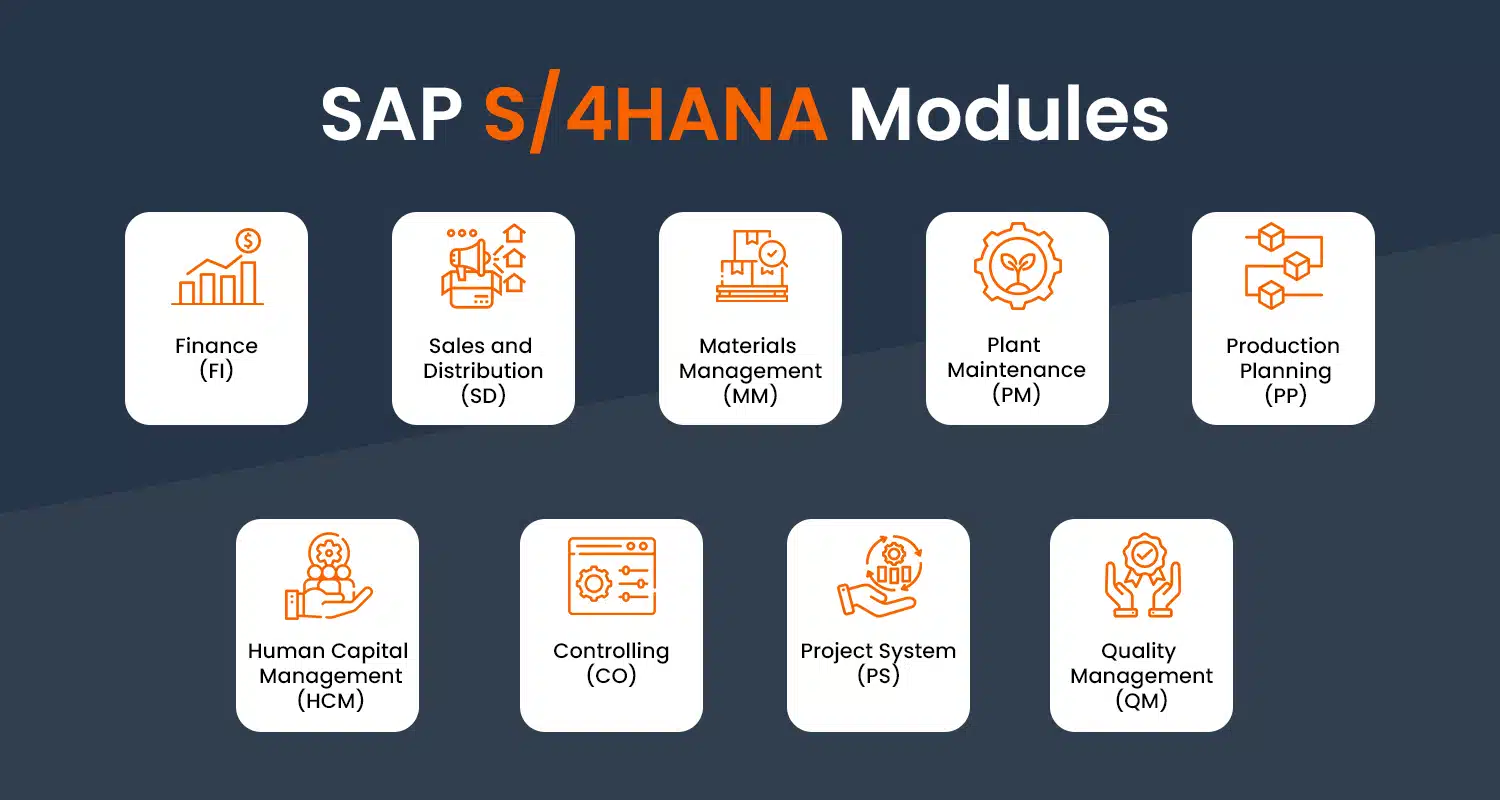Businesses nowadays are always looking for ways to improve their processes and continue to be successful in the dynamic solution market. One very important tool that has truly altered the way business processes are carried out is SAP S/4HANA modules.
Several features in this intelligent and extensive ERP collection are intended to enhance business operations and increase efficiency.
Understanding SAP S/4HANA

Core Modules
Finance (FI):
The SAP S/4HANA finance module handles the majority of corporate financial tasks, including accounting, financial planning, and evaluation. Utilizing cutting-edge contemporary technologies, it applies rapid comprehension to financial efficiency and governs conformance.
By utilizing the information already in place, this enables services to make bold, data-driven financial decisions.
With its seamless integration and sophisticated analytics, the SAP S/4HANA Finance component functions as a vital asset, optimizing financial processes, guaranteeing compliance, and improving overall business efficiency through informed decision-making.
Sales and Distribution (SD):
From initial order placement to final delivery and invoicing, SAP S/4HANA’s Sales and Distribution module acts as the key center for handling every facet of the sales experience.
Its integration powers go beyond its own domain; it integrates with finance and materials management (MM) modules with ease.
By ensuring a smooth information flow from order to cash, this integration gives firms a thorough understanding of their operations. Organizations may improve customer happiness, reduce errors, streamline operations, and increase efficiency and profitability throughout the whole sales funnel by combining these vital tasks.
Human Capital Management (HCM):
This module deals with payroll, labor force preparation, ability growth, and various other human resources obligations. Utilizing this, companies might strengthen their one-upmanship by proactively determining, supporting, and preserving outstanding skills.
In addition, it guarantees compliance with strict labor laws, promoting a law-abiding and morally upright workplace.
This module, with its extensive features and statistics, enables HR professionals to improve employee engagement, allocate resources optimally, and cultivate an environment that promotes ongoing growth and development inside the company.
Controlling (CO):
SAP S/4HANA’s Controlling module provides a strong toolkit for accurate cost accounting, perceptive profitability analysis, and rigorous internal reporting, making it a valuable strategic ally of the Finance module.
Through the utilization of these instruments, companies acquire a competitive advantage in terms of cost optimization and profitability enhancement in several business domains.
Decision-makers can lead the company towards sustainable growth by using the Controlling module’s actionable insights, which enable them to scrutinize operational expenditures and uncover revenue-generating opportunities.
Because of its seamless interaction with other modules, financial management is ensured, promoting adaptability and durability in a constantly changing market environment.
Materials Management (MM):
An effective tool for controlling crucial supply chain elements is SAP S/4HANA’s Materials Management module. By ensuring the timely acquisition of materials and optimizing inventory levels to meet demand, it effectively manages procurement procedures.
Through the smooth coordination of logistical procedures, it promotes effective management of supplier relationships, ensuring supply chain dependability and uniformity.
Additionally, by making it easier for materials to go from procurement to production, this module significantly improves overall operational efficiency. Better organizational performance and more effective supply chain procedures follow from this.
Project System (PS):
SAP S/4HANA’s Project System module makes it easier to handle projects thoroughly in a variety of sectors. It provides enterprises with strong features to effectively plan, carry out, and manage projects.
This module is essential to the success of the project since it provides sophisticated capabilities for resource allocation, budgeting, and progress tracking. It makes it possible for businesses to strictly adhere to budgets and schedules, which eventually improves the results of project delivery.
Due to its simple features and seamless integration capabilities, the Project System module improves operational excellence and stakeholder satisfaction by empowering businesses to manage projects from start to finish.
Plant Maintenance (PM):
This module is in charge of managing inspections, repairs, and preventative maintenance for necessary properties and equipment. Efficient downtime reduction, asset longevity, and increased overall equipment efficiency (OEE) are all achieved through precise maintenance job management.
This part ensures that the tools function as efficiently as possible, reducing downtime and increasing productivity through proactive maintenance planning and predictive analytics.
Furthermore, it makes cost-effective possession management alternatives possible, allowing firms to release resources appropriately and increase return on investment (ROI).
Production Planning (PP):
Using SAP S/4HANA’s Production Planning module is essential for managing industrial processes. Through the provision of accurate scheduling, careful planning, and efficient control over production processes, it allows enterprises to optimize resource use.
It’s also good at cutting lead times, which guarantees quick and flexible production cycles. This module doesn’t end there; it also has a significant impact on raising the bar for product quality and developing a manufacturing excellence culture.
Because of this comprehensive approach, the Production Planning module’s manufacturing efficiency is significantly increased, allowing enterprises to thrive in competitive marketplaces.
Quality Management (QM):
Vibrantly monitoring product quality across the supply chain, SAP S/4HANA’s Quality Management module organizes rigorous quality control procedures.
It makes sure that products fulfill consumer and regulatory standards by carefully supervising inspection processes, putting them through rigorous testing, and swiftly informing stakeholders of any variations in quality.
This module enables companies to maintain flawless standards, enhancing their standing as dependable and superior suppliers in the market by smoothly incorporating quality assurance into all production and distribution stages.
Additional Modules
Apart from the aforementioned core modules, SAP S/4HANA provides an extensive range of specialist modules that are customized to suit particular industries and business operations. Among them are:
Asset Management (AM): Maintains and keeps an eye on important assets to enhance efficiency and uptime.
Real Estate Management (RE): Oversees leases, real estate properties, and profiles of residential and commercial properties.
Travel Management (TM): Simplifies conformity, cost control, and travel reservations.
Product Lifecycle Management (PLM): This system incorporates procedures and upkeep with property administration.
Environment, Health, and Safety (EHS): Guarantees adherence to safety and security and ecological laws.
Governance, Risk, and Compliance (GRC): Oversees conformity as well as threats for the whole firm.
Sourcing and Procurement (S&P): Streamlines purchasing procedures and provider alliances.
Enterprise Asset Management (EAM): This system combines operations and maintenance with asset management.
Extended Warehouse Management (EWM): Improves stock precision along with warehouse performance.
Supply Chain Management (SCM): This powerful technique helps in managing and improving the supply chain from source to destination.
Customer Relationship Management (CRM): Supervises client relations and sales management.
Benefits of SAP S/4HANA Modules
Enhanced User Experience: Role-based accessibility as well as an attractive interface are two functions of SAP S4 HANA modules that help in improving individual fostering as well as efficiency.
Scalability: The flexible nature of SAP S/4HANA empowers companies to progress with changing needs. Its vibrant structure permits smooth modifications to market changes and promotes simple scaling for development.
Using the flexible basis of SAP S/4HANA, businesses can drive continual technical developments, establish a competitive advantage, and connect their IT infrastructure with strategic goals.
Compliance and Risk Management: Companies may use SAP S/4HANA’s flexible basis to generate continuous technical developments, acquire a competitive advantage, and match their IT infrastructure with strategic goals.
Real-Time Insights: SAP S/4HANA takes advantage of sophisticated in-memory handling to provide firms with immediate accessibility to important information, assisting in timely decision-making, and versatility to changing market problems.
Companies might acquire real-time understandings with this modern technology, guaranteeing their adaptability as well as responsiveness in a lively environment and giving them a competitive advantage.
Process Optimization: These carefully created modules, which are meant to optimize key business operations such as finance, supply chain, HR, and customer management, raise a number of other elements of operations.
Businesses can strengthen themselves for long-term growth and increased market competitiveness by optimizing procedures in five critical areas, which will save a substantial amount of money and increase efficiency.
Integrated Platform: The fragmentation brought about by different systems and data silos is eliminated when SAP S/4HANA unifies essential business processes onto a single platform.
Better decision-making and overall business performance result from this integration’s increased operational efficiency, streamlined procedures, and promotion of real-time departmental cooperation.
Integration Capabilities
SAP S/4HANA effortlessly merges with both SAP tools and outside software, offering unparalleled integration. Firms can link their components with third-party systems, cloud tools, and IoT devices using preset connections and APIs.
This leads to increased productivity and encourages creativity throughout the organization by enabling total automation of business processes and smooth data sharing.
Know More – SAP ECC to S/4HANA Migration
Conclusion: Harnessing the Power of SAP S/4HANA Modules for Enhanced Business Efficiency
To sum up, SAP S/4HANA cloud offers a comprehensive array of tools for businesses seeking to enhance productivity and optimize workflows. Whether addressing core aspects like finance and MM or tailored solutions for specific industries, SAP S/4HANA modules empowers firms with the tools needed to embrace digital evolution and remain competitive in today’s ever-changing market. Leveraging the capabilities of SAP S/4HANA alongside its seamless integration capabilities enables companies to bolster flexibility, improve transparency, and foster profitability across their operations.













